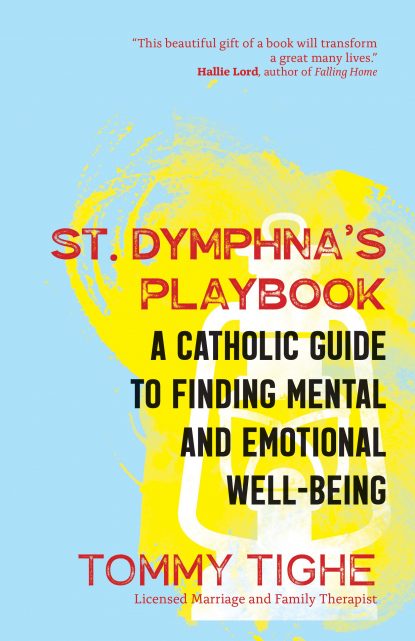
This is the book cover of “St. Dymphna’s Playbook: A Catholic Guide to Finding Mental and Emotional Well-Being” by Tommy Tighe. The book is reviewed by Nancy L. Roberts. (CNS photo/courtesy Ave Maria Press)
“St. Dymphna’s Playbook: A Catholic Guide to Finding Mental and Emotional Well-Being” by Tommy Tighe. Ave Maria Press (Notre Dame, Indiana, 2021). 205 pp., $17.95.
Depression, anxiety, trauma and grief are challenging mental health challenges today. In the sea of practical advice given to deal with them, “St. Dymphna’s Playbook” offers a uniquely Catholic perspective.
Tommy Tighe, a licensed marriage and family therapist, combines his extensive clinical experience with insights from Scripture and the saints to give readers practical tools to cope.
Based on Tighe’s podcast of the same name, each chapter of the book gives an accessible explanation of a specific mental health concern. These include loneliness, irritability, hopelessness and relationships.
Tighe then clearly describes characteristic symptoms and engages Catholic spiritual practice to offer suggestions to address each condition. Each chapter highlights a Catholic saint or holy person who faced the same issue, followed by a closing prayer.
“Am I anxious or just worried?” Thus begins the chapter on anxiety.
Here Tighe explains that “similar to every other mental health condition, we need to seek help if the symptoms we are experiencing make it hard for us to carry out our day-to-day activities or responsibilities, cause problems in our relationships or at work, or make other areas of our life difficult to engage in.”
Take heed, he advises, “if you experience anxiety even when there’s no specific threat or if your anxiety is out of proportion to the threat taking place.”
[tower]
Frequent scriptural mention of anxiety suggests that Christ and the early church understood how much it affects us. And, Tighe adds, “how deeply Christ wants to give us peace amid our struggles.”
He offers St. Padre Pio as an example of one who battled anxiety yet found relief through his repeated mantra, “Pray, hope and don’t worry.”
Many will likely recognize themselves in the chapter on irritability. After all, this is one of the most common mental health challenges.
But “persistent irritability is a common sign of depression,” Tighe advises, and the sufferer may benefit from therapy and medication. There is also comfort to be found in what Ecclesiastes 7:8-10 says about irritability (which Tighe quotes):
“Better is the end of a thing than its beginning; better is a patient spirit than a lofty one. Do not let anger upset your spirit, for anger lodges in the bosom of a fool. Do not say: How is it that former times were better than these? For it is not out of wisdom that you ask about this.”
He also mentions several relatable saints who lived with irritability, such as St. Jerome, “who was known to carry around a stone that he would hit himself with every time he lost his temper.”
Another is St. Vincent de Paul, who was described as “‘by nature of a bilious temperament and very subject to anger.'”
Tighe also recounts what James Forest, a Catholic Worker editor, said about Dorothy Day: “She’s not all sugar. See, she’s tough, she’s stubborn, she doesn’t listen well all the time, she holds grudges, and like the other Catholic radicals, she has a problem about sometimes being too judgmental.”
Still, Forest also thought of her as “a genius and a saint.”
Fittingly, this chapter’s closing prayer is St. Teresa of Ávila’s “Let nothing perturb you. … All things pass. God does not change. Patience achieves everything.”
Aptly titled after St. Dymphna, the patron saint of those with mental health issues, the book achieves its author’s hope that it can “remind us that we are not alone,” that we are part of “a Catholic community where we all suffer together, unafraid to walk forward with our sisters and brothers through their valley of tears.”
Engagingly written, “St. Dymphna’s Playbook” also includes a brief appendix of mental health resources. The book will command the attention of anyone seeking a Catholic spiritual perspective on these common mental health challenges.
***
Roberts is a journalism professor at the State University of New York at Albany and the author/co-editor of two books about Dorothy Day and the Catholic Worker.
PREVIOUS: ‘Marry Me’ is better left at the theater’s threshold
NEXT: ‘The Batman’ explores darkly and at length, Who is a hero?



Share this story